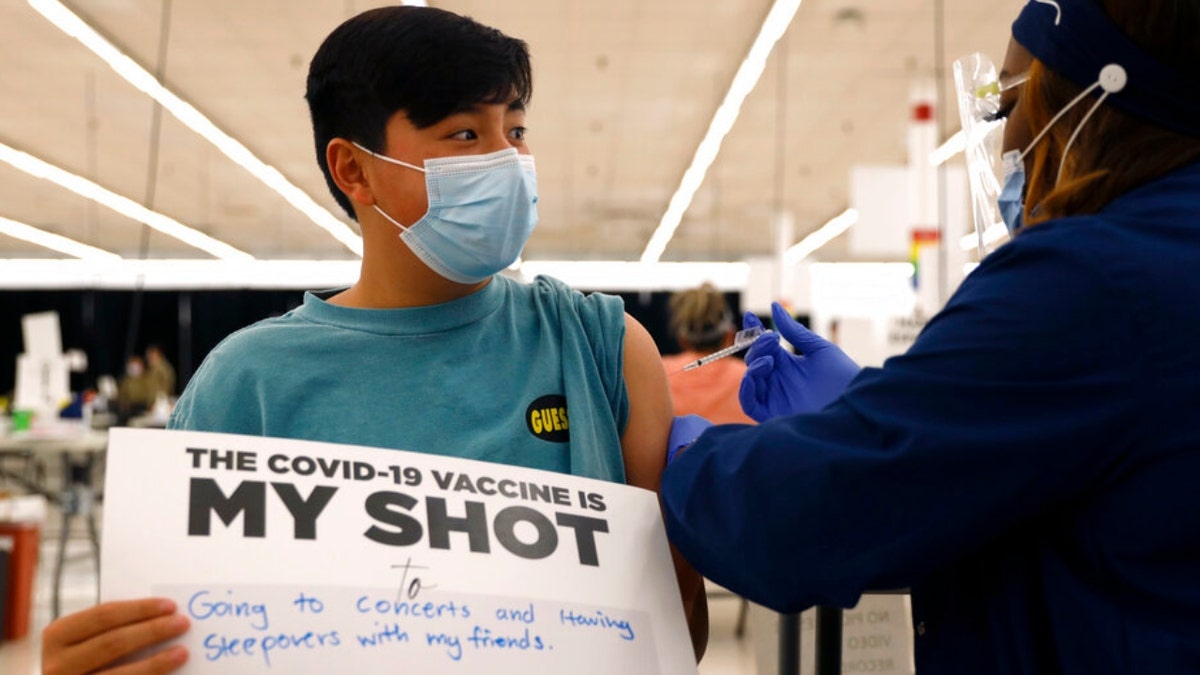Fox News Flash top headlines for January 4
Fox News Flash top headlines are here. Check out what's clicking on Foxnews.com.
The Food and Drug Administration (FDA) said Monday that the interval between a second dose of Moderna's COVID-19 vaccine and a booster shot remains six months.
"Right now if you got J&J, you get a booster after two months. If you got Pfizer as your primary series, you can get a booster at five months or beyond. If you got Moderna, you can get a booster at six months or beyond. Whatever you decide to get a booster of," acting FDA Commissioner Janet Woodcock said in a call with reporters.
"So, for right now, safe action pertains to the Pfizer vaccine. The boosters for Moderna remain unchanged, for the moment, at six months," Dr. Peter Marks, the director of the FDA Center for Biologics Evaluation and Research, added.
FDA APPROVES PFIZER CORONAVIRUS VACCINE BOOSTERS FOR CHILDREN AS YOUNG AS 12
Their comments come after the FDA's move to authorize a third dose of the Pfizer-BioNTech vaccine for emergency use in children ages 12 to 15 and its decision to shorten the period for booster shot eligibility to "at least five months."
In addition, the agency said it would allow a third primary series dose of the Pfizer vaccine for "certain immunocompromised children 5 through 11 years of age."
"Throughout the pandemic, as the virus that causes COVID-19 has continuously evolved, the need for the FDA to quickly adapt has meant using the best available science to make informed decisions with the health and safety of the American public in mind," Woodcock said in a statement announcing the updates. "With the current wave of the omicron variant, it’s critical that we continue to take effective, life-saving preventative measures such as primary vaccination and boosters, mask wearing and social distancing in order to effectively fight COVID-19."

Lucas Kittikamron-Mora, 13, holds a sign in support of COVID-19 vaccinations as he receives his first Pfizer vaccination at the Cook County Public Health Department, May 13, 2021 in Des Plaines, Ill. (AP Photo/Shafkat Anowar, file)
The FDA said it "determined that the protective health benefits of a single booster dose of the Pfizer-BioNTech COVID-19 vaccine to provide continued protection against COVID-19 and the associated serious consequences that can occur including hospitalization and death, outweigh the potential risks in individuals 12 through 15 years of age."
"Additionally, peer-reviewed data from multiple laboratories indicate that a booster dose of the Pfizer-BioNTech COVID-19 vaccine greatly improves an individual’s antibody response to be able to counter the omicron variant," the FDA wrote. "Authorizing booster vaccination to take place at five months rather than six months may therefore provide better protection sooner for individuals against the highly transmissible omicron variant."
PHYSICIAN WRITES THAT COVID-19 TESTS SHOULD BE AVAILABLE FOR PEOPLE WHO NEED THEM MOST
The chief safety concern for younger teenagers is a rare side effect called myocarditis: a type of heart inflammation seen mostly in younger men and teen boys who get either the Pfizer or Moderna vaccines. The vast majority of cases are mild and far milder than the heart inflammation caused by the coronavirus.
The agency noted that it continues to review data concerning all available vaccines and would "provide additional updates as appropriate."
A panel for the Centers for Disease Control and Prevention (CDC) is expected to decide later this week whether to recommend boosters to the younger teens, including a final decision by CDC Director Dr. Rochelle Walensky.
Boosters are already recommended for everyone 16 years of age and older.
While vaccines still offer protection against serious illness from COVID-19, officials are urging everyone who is eligible to receive a booster shot amidst a surge of the omicron variant.
Child hospitalizations are rising due to the variant of concern, and most of the patients are unvaccinated.
CLICK HERE TO GET THE FOX NEWS APP
Pfizer is studying its vaccine in even smaller doses, for children younger than 5.
The Associated Press and Fox News' Greg Norman contributed to this report.


